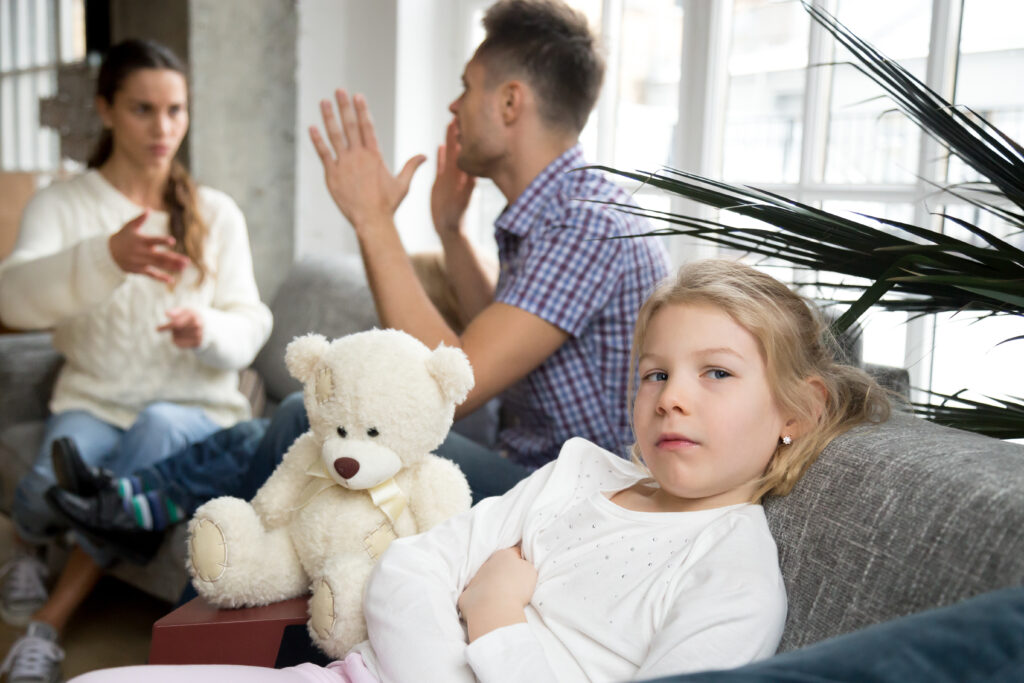6 Signs Your Relationship With Your Parents Isn’t Healthy

When you think about your relationship with your parents, would you describe it as warm and loving? Or do you feel like all you want to do is stay as far away from them as you possibly could?
Having parents should mean that you always have someone to lean on, someone that is not only your family but your best friend, someone whose presence feels like home.
Unfortunately, blood is not always thicker than water, and some people can be robbed of that beautiful feeling of having a strong and loving bond with their parents.
Here are 6 signs that tell you your relationship with your parents isn’t healthy.
1. You feel like you can’t live up to their expectations

Are your parents satisfied with the path you chose for yourself? Or did you even get lucky enough to choose with your heart? We all hear about this often: a child wants to be an artist, but their parents already made a list of the best medical schools. A child wants to play the guitar for a rock’n’roll band, but their parents already paid for violin lessons. A child hates sports, but their parents already got them shoes for the football practise.
Parents often fantasise about the perfect life for their children, and more often than not, those fantasies don’t line up with their child’s interests, talents or tendencies. They could tell you that what you want for yourself is bad – “you can do better than that”, “I didn’t raise you for that”, “you should listen to me because I know better”.
Even if your parents justify themselves by saying they only mean well for you, by trying to live through you, they are not doing you any favors. The earlier those expectations are set, the bigger the damage for your psychological health. Growing up, you might have felt guilt and shame that stemmed from thoughts of disappointing the people who brought you to this world. You may have also felt like a failure or a bad person, or confused about who you actually are.
Maybe you are going through this at the moment, or maybe you still feel the wounds from experiencing it in your childhood. If that is the case, you need to learn how to let those feelings go. It is certainly not your job to satisfy your parents’ needs. You are your own person, and you have a right to build your own life. Talking to your friends or a professional could hopefully help you take that weight off your shoulders.
2. You never spend time together

When was the last time you and your parents went on a family vacation? Or watched a movie together? Or even had a nice meal together?
If you only see your parents while you walk from the front door to your room and back, your relationship may not be as healthy as it should be. Of course, maybe your parents work very hard and long hours and they cannot spend more time with you. But it’s not the same if the whole family is home often, each one in their rooms, having fun not with each other but with their phones or some other distraction.
Not spending any quality time with your family probably makes you feel lonely and sad. Maybe you think you’re not interesting enough for them to hang out with you. Or maybe you’ve stopped caring and don’t even want to spend time with them anymore.
Either way, it is not a way a family should function. Hopefully, you can make up for it in some other ways. Spending time with people close to you could ease the loneliness and make you feel like you belong.
3. You get 100% criticism, 0% praise.

Maybe you’re familiar with this: you got the highest grade in your class, but it was a B. Even though it’s not the highest grade possible, you still did the best out of everyone! You feel proud of yourself, and you share the news with your parents. But then, instead of acknowledging your success, you get showered with criticism: How come you didn’t get an A?! B is a low grade! You should have studied more!
If you’ve found yourself in a situation similar to this, I’m sure you have more examples to share. No matter what you do, it’s never good enough for your parents. No matter how well you do, still not good enough. And it doesn’t stop there, even mundane things like setting up the table or doing your hair can be a trigger for verbal attack for parents who keep praise out of their vocabulary.
And I’m sure it’s hard, feeling like you can’t do anything right. There are studies that show that having highly critical parents increases risk for depression and anxiety, which can impact your relationships with people you love, your work, your hobbies and life in general.
To help yourself, you could try a few things:
- Try to understand why they are being like this (often times it’s because of their own insecurities)
- Recognize how it makes you feel (you can journal about it, write them a letter that you’re going to throw away later, or share your feelings with your best friend over a cup of coffee)
- Recognize how it affects you (if you think constant criticism negatively affects your feelings of self-worth and motivation, try talking to a therapist to challenge those thoughts)
And at the end of the day, get some love and praise from the person who knows and understands your qualities and achievements the best – yourself!
4. You avoid talking in front of them

How often do you speak your mind in front of your parents? No matter what it is – your opinion about the new furniture, lunch choice, and not to mention something more serious like politics or news. Do you openly say what you want to say or do you keep it to yourself because you don’t want to be shamed for having an opinion once again?
Many people whose relationship with their parents is unhealthy learned how to keep quiet. If you’re in the same situation, you may have experienced your parents laughing at you, shaming you, telling you to “shush your mouth“… They make you feel that just because you’re young, you’re also stupid. Also, you may avoid asking questions about anything, because you already know the answer: “it’s not your problem“. You never get an explanation for their actions and choices, never comment on anything and just… stay back and keep to yourself.
It’s pretty clear where this could all lead. If you never learned how to communicate with people who are supposed to teach you how, today you may have problems in other aspects of life. Other people may take advantage of you because you don’t know how to stand your ground, maybe you always keep quiet when hanging out with friends, and you’re probably having some problems with your self esteem.
Unlearning this, by yourself or with the help of a professional, is an important step to take for you to get your voice back!
5. They control every little thing you do

Where are you going? With whom? When will you be back? Who will drive? Who will be there? What are their mothers’ names?…. And so on. Are those questions familiar to you?
When you’re a young child or a teenager, parental control is important for many obvious reasons. But sometimes this control can go over the limits, so much that you feel like you’re not even your own person anymore. They want to control everything from A to Z: how you dress, who you hang out with, what your room looks like, where you go to school/college, how you feel, how you don’t…
It can feel suffocating. They think they’re doing the right thing, but overly controlling parents can do a lot of damage to your feelings of autonomy. And oftentimes those feelings persist even when you get away from the controlling household. A therapist specializing in relational therapy may help you overcome those issues and deal with your controlling parents.
6. They never show affection

Healthy families are warm and loving. They give each other hugs, kiss on the forehead, a pat on the back. They let each other know (not necessarily verbally, but in some way) that they love and appreciate each other. Unhealthy ones just pass by each other and they feel ashamed of expressing love. Which one is yours?
When your relationship with your parents is unhealthy, it may seem like all those pretty little affectionate things only happen in books and movies. Or you may think parents and kids shouldn’t even be affectionate towards each other, if that’s what you’re used to. But not only is lack of affection in a family unhealthy, it can also leave a negative impact on children who grow up in such family dynamics.
A large body of research confirmed that the lack of affection can be a reason for various problems in later life for children of unaffectionate parents. Lack of affection negatively impacts a child’s development and mental health.
For example, in 2010, researchers at Duke University Medical School found that babies with affectionate and attentive mothers grow up to be happier, resilient, and less anxious. Also, by growing up in an affectionate household, they are likely to have higher self-esteem, improved academic performance, better parent-child communication, and fewer psychological and behavior problems. But their peers who weren’t so lucky tend to have lower self esteem and feel more alienated, hostile, aggressive, and anti-social.
Of course, not showing affection doesn’t have to mean your parents don’t love you in their own way. Maybe one day they learn how to show it. Until then, think about your friends and other family, and know that you are loved and never alone.
Do you relate to any of these signs? Do you think your family dynamics could be healthier?
Your parents may never change, but you certainly will. Your feelings, thoughts and attitudes will grow. Healing from a bad home may take some time, but you can start right away by working on yourself, so one day you can leave it all behind.
Thank you for reading!
Written by: Stela Košić
If you wish to find out more about topics on child-parent relationship, feel free to check out some of the videos from Psych2Go’s YouTube channel:
- 8 Ways to Improve Parent Child Relationship
- Unhealthy Mother Daughter Relationships
- 7 Signs of a Toxic Family
- 6 Types of Unhealthy Father Daughter Relationships
References:
- Braucher, D. (2020, April 8). Parental Expectations: The Helpful and the Harmful. Psychology Today. https://www.psychologytoday.com/us/blog/life-smarts/202004/parental-expectations-the-helpful-and-the-harmful?amp
- Cikanavicius, D. A. (2018, October 7). The Curse of Trying to Meet Your Parents Expectations. Psych Central. https://psychcentral.com/blog/psychology-self/2018/10/childhood-parents-expectations#5
- Co., P. (2021, February 3). How a Parent’s Affection Shapes a Child’s Happiness for Life. The Gottman Institute. https://www.gottman.com/blog/how-a-parents-affection-shapes-a-childs-happiness-for-life/
- Fernandez, G., MD. (2019, July 23). Importance of Family Time on Kids Mental Health and Adjustment to Life. Child Development Institute. https://childdevelopmentinfo.com/psychology/importance-of-family-time-on-kids-mental-health-and-adjustment-to-life/#gs.ckfzur
- Goidani, N. (2019, August 6). Lack of Affection – Does That Hamper Your Child’s Growth. WOW Parenting. https://wowparenting.com/blog/lack-of-affection/
- How Do You Know if Your Parents Are Too Controlling? 7 Signs & 8 Effects. (2021, June 23). MedicineNet. https://www.medicinenet.com/how_to_know_if_your_parents_are_too_controlling/article.htm
- James KM, Owens M, Woody ML, Hall NT, Gibb BE. Parental Expressed Emotion-Criticism and Neural Markers of Sustained Attention to Emotional Faces in Children. J Clin Child Adolesc Psychol. 2018;47(sup1):S520-S529. doi: 10.1080/15374416.2018.1453365. Epub 2018 May 2. PMID: 29718731; PMCID: PMC6214793.
- Li, M. P. S. (2021a, August 26). Controlling Parents – The Signs And Why They Are Harmful. Parenting For Brain. https://www.parentingforbrain.com/controlling-parents/
- Maselko, J., Kubzansky, L., Lipsitt, L., & Buka, S. L. (2010). Mother’s affection at 8 months predicts emotional distress in adulthood. Journal of Epidemiology & Community Health, 65(7), 621–625. https://doi.org/10.1136/jech.2009.097873
- mindbodygreen. (2021, June 25). 11 Signs Of A Controlling Parent + What To Do About It As An Adult. https://www.mindbodygreen.com/articles/signs-of-controlling-parents-and-how-to-cope-as-adult
- Pyramid Healthcare. (2021, August 9). Effects of Parental Criticism on Self Esteem. Pyramid Family Behavioral Healthcare. https://pyramidfbh.com/healing-from-parental-criticism/




Responses